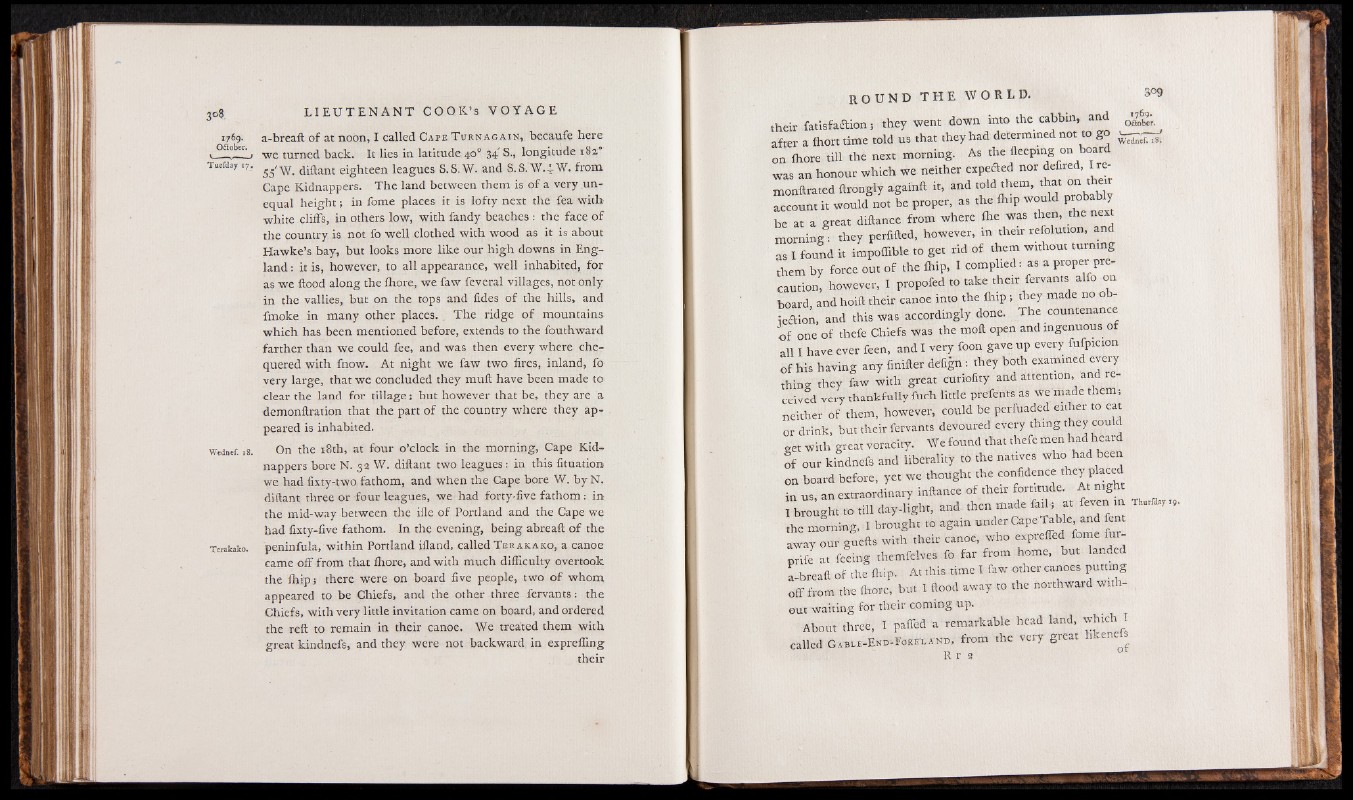
1769. a-breaft of at noon, I called C a p e T u r n a g a i n , becaufe here
■ °-°-er‘ 1 we turned back. It lies in latitude 40° 34 S., longitude 182
Tuefday 17. diftant eighteen leagues S.S.W. and S. S.W.f W. from
Cape Kidnappers. The land between them is of a very unequal
height •, in fome places it is lofty next the fea with
white cliffs, in others low, with fandy beaches : the face of
the country is not fo well clothed with wood as it is about
Hawke’s bay, but looks more like our high downs in England
: it is, however, to all appearance, well inhabited, for
as we flood along the fhore, we faw feveral villages, not only
in the vallies, but on the tops and fides of the hills, and
fmoke in many other places. The ridge of mountains
which has been mentioned before, extends to the fouthward
farther than we could fee, and was then every where chequered
with fnow. At night we faw two fires, inland, fo
very large, that we concluded they muft have been made to
clear the land for tillage; but however that be, they are a
demonftration that the part of the country where they appeared
is inhabited.
Wednef. 18. On the 18th, at four o’clock in the morning, Cape Kidnappers
bore N. 32 W. diftant two leagues: in this fituation
we had fixty-two fathom, and when the Cape bore W. by N.
diftant three or four leagues, we had forty-five fathom: in
the mid-way between the ifle of Portland and the Cape we
had fixty-live fathom. In the evening, being abreaft of the
Terakako. peninfula, within Portland ifland, called T er akako, a canoe
came off from that fhore, and with much difficulty overtook
the fhip; there were on board five people, two of whom
appeared to be Chiefs, and the other three fervants: the
Chiefs, with very little invitation came on board, and ordered
the reft to remain in their canoe. We treated them with
great kindnefs, and they were not backward, in expreffing
their
their fatisfattion; they went down into the cabbin, and
after a fliort time told us that they had determined not to go u— jf
on fhore till the next morning. As the fleeping on board
was an honour which we neither ex petted nor defired, I re-
monftrated ftrongly againft it, and told them, that on thei
account it would not be proper, as the fhtp would probably
be at a great diftance from where fhe was then, the n
morning8: they perfifted, however, in their refolution, and
as I found it impoffible to get rid of them without turning
them by force out of the fhip, I complied: as a proper precaution!
however, I propofed to take their fervants alfo on
board, and hoift their canoe into the fhip 9 they made no ob-
iettion, and this was accordingly done. The countenance
o f one of thefe Chiefs was the moft open and ingenuous of
all I have ever feen, and I very foon gave up every fufpicion
of his having any finifter defign: they both examined every
thing they faw with great cunofity and attention, and r -
ceived very thankfully fuch little prefehts as we made them;
neither of them, however, could be perfuaded either to eat
or drink, but their fervants devoured every thing ^ coul
get with great voracity. We found that thefe men ^ d heard
of our kindnefs and liberality to the natives who had been
on board before, yet we thought the confidence they place
in us an extraordinary inftance of their fortitude. At mg
b o u g h t to till day-light, and then made fail; at feven in « J
the morning, I brought to again under Cape Table and fern
away our guefts with their canoe, who expreffed fome fur-
nrife at feeing themfelves fo far from home, but landed
a-breaft of the fhip. At this time I faw other canoes putting
off from the fhore, but 1 flood away to the northward without
waiting for their coming up.
About three, I paffed a remarkable head land, winch I
called GABLE-ENB-roREXA-tm, from the very great hkenefs
R r s